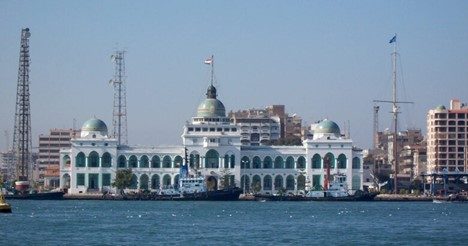
Social media activists have circulated what was said to be a “memorandum of understanding” between Egypt and an Israeli company, according to which Egypt would grant the Israeli company (said to be run by Salmon Werner) a concession to the Suez Canal for a period of 99 years.
According to the leaked memorandum of understanding, the financial agreement that the concessionaire company agreed upon was concluded with the Suez Canal Authority Fund, which is authorized to operate in accordance with a recently approved Egyptian law in this regard. The leaked document claims that the scope of the contract includes West Port Said Port, East Port Said Port, Adabiya Port, the shipping lane, the western industrial zone, and the small industrial zone.
Also based on the memorandum, one of the most important conditions states that it is confidential and stipulates that it must remain confidential between its parties, where Sisi, Madbouly, and Solomon have reportedly signed every single paper, as well as at the end of the MoU.
However, the Egyptian government later denied the authenticity of the leaked document, confirmed that it was fake.
Commenting on a tweet by Edy Cohen, an Israeli media professional, addressing the leaked document, Dr. Sam Youssef tweeted, saying: They now claim that the Suez Canal contract was leaked from certain parties. Who are these entities? And why is this contract drafted so professionally? And for whose benefit? And who placed himself under suspicions from the very beginning by insisting on establishment of a sovereign fund for the Suez Canal which belongs to the Egyptian people that alone has the right to act in anything related to sale or concession? Just questions!!!
Inthis context, Maged Mandour, a political analyst, has recently published an important article on Carnegie Endowment for International Peace, titled, “Sisi’s Suez Canal Debacle”, addressing the Suez Canal Authority Fund Law that has recently been approved by the Egyptian parliament, whose most members are almost controlled by security services.
“A recently approved amendment regarding Suez Canal operations highlights the problems inherent to the Egyptian regime’s model of capitalism,” Mandour said in his piece that was published on 2 February 2023.
“On the 19th of December, the Egyptian parliament offered preliminary approval for an amendment to law 30 issued in 1975 which pertains to the regulation of the operations of the Suez Canal Authority.
The amendment to the law provides for the creation of a “Suez Canal Fund,” where surplus revenue from the operation of the Canal is to be invested. The fund is also allowed to lease, sell, and purchase assets, establish companies, and invest in financial instruments. The fund is planned to have a board of directors which is appointed by the Council of Ministers and led by the head of the Suez Canal Authority,” Mandour said, continuing his piece, as follows:
The aim of the law, according to a statement made by Sisi, is to allow the Suez Canal Authority to accumulate its own cash reserves for necessary Canal development projects without having to revert to the Ministry of Finance to procure the required funds.
The amendment will also open up the Suez Canal Authority to private investors, if the proposed fund opts to sell some of its assets, or to establish a company with a private party. Notably missing in the proposed amendment, however, is any mention of legislative oversight for the operation of the fund.
Upon closer examination, it becomes clear that the regime’s decision to create the fund is an indication of a lack of political will to reform its militarized form of state capitalism. On the contrary, the regime seems to be doubling down on its policy.
For example, the Suez Canal Authority has long been within the purview of the military establishment, with ex-naval officers acting as heads of the Authority without interruption since 1964, and the military taking an off-the-books commission for every ship that crosses the Canal.
In keeping with that tradition, Sisi announced that the fund will be under the supervision of a “sovereign entity,” which is a clear euphemism for the intelligence services or military establishment.
Sisi made the statement even though the amendment places authority over appointments to the board of directors within the Council of Ministers, which is—theoretically—a civilian body. This, in essence, will grant the military access to an unsupervised fund where it can siphon off large amounts of Canal revenues with no civilian oversight.
The decision comes in the midst of a burgeoning economic crisis caused by a severe shortage of hard currency, which saw the value of the pound drop to a historic low against the dollar following three devaluations in less than one year.
Since at least some of the Canal’s revenue will be redirected to the proposed fund, its establishment will only further deprive the state of an important source of hard currency which accounted for 7.4 percent of the current account receipts in the first quarter of 2021. This crisis situation is compounded by a shortage of basic goods and a five-year high rate of inflation that stood at 18 percent in November.
Thus, the development of the fund appears to have two primary goals. First, it aims to consolidate support for the regime within the military establishment in the midst of a deep economic and social crisis. Second, it seeks to create a compromise by allowing private investors to participate in the operations of the Canal without the loss of military control.
Indeed, the plan sets the scene for the capitalization of the Canal without changes to its governance rules, or an increase in transparency regarding the use of its revenue. While this indicates that the regime is trying to have its cake and eat it too, it also shows that, in spite of the spectacular collapse of the state’s model of economic development, the regime insists on continuing down the defective path it has created.
“This means that the economic crisis will only get worse with devastating consequences for Egyptians,” Mandour concluded.



